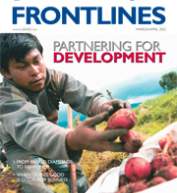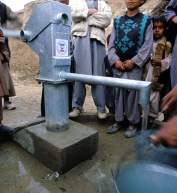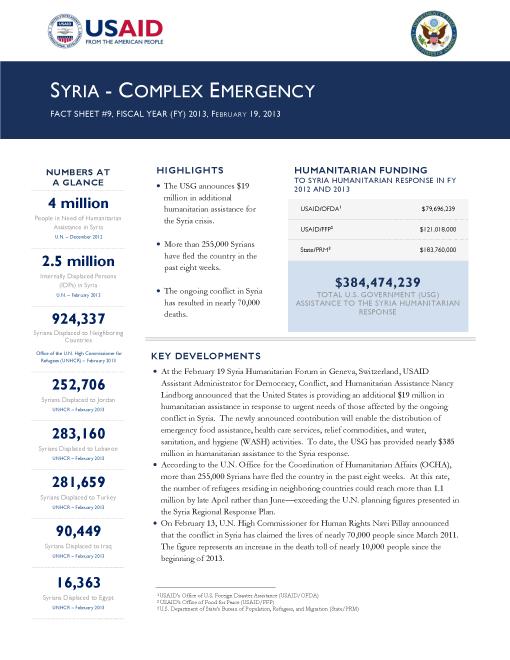I wish to thank the United Nations, the European Union, and the Organization of Islamic Cooperation for hosting this event. We deeply regret that the Syrian Opposition Coalition and its Assistance Coordination Unit were not able to participate in this forum, as they are a vital link to the provision of humanitarian aid to the millions of Syrians in need. We cannot continue to have an effective humanitarian forum without full inclusion of those essential for meeting critical humanitarian needs.
The United States continues to work through all possible channels to most effectively deliver aid. This includes working through the UN, NGO partners, local Syrian organizations and committees. Regardless of political affiliation, we are directing assistance to the most vulnerable people, and we are doing this in coordination with the Syrian Opposition Coalition.
We gather today only a few weeks after the international community came together in Kuwait to address the enormity of humanitarian needs. We were pleased by the generous pledges made by donors, especially our friends in the Gulf, and we urge all countries honor the funding commitments made in Kuwait.
Syria Complex Emergency Fact Sheet #9 - 02/19/13 ![]() (pdf - 461k)
(pdf - 461k)
Suffering and displacement within Syria have grown exponentially. Just since Kuwait we have seen a steep increase in refugees with more than 950,000 refugees already having fled to neighboring countries. The recent ACU survey suggests that internal displacement far exceeds earlier estimates, perhaps even doubled. It has become more critical than ever to contribute desperately needed funding, to collectively press for greater access, both cross line and cross-border, and to end to the violence that has already taken the lives of 70,000 Syrians.
Providing effective assistance to those in greatest need requires consistent, secure access. The Syrian government must stop obstructing the delivery of humanitarian assistance, and -- likewise -- no armed opposition group should hinder aid delivery. All sides must do whatever it takes to allow humanitarian assistance to reach those in need whenever and wherever that may be.
In recent weeks, we witnessed a significant breakthrough. UN-sponsored convoys of trucks traveled through Syria, across battle lines, and to the far north of the country to assist displaced Syrians who had been beyond the reach of aid workers. These operations involved delicate negotiations with the Syrian Government and opposition factions in control along the route. The Syrian Opposition Coalition has been a critical partner in facilitating secure, reliable access to areas outside of government control. These cross-line operations have made a tangible impact and delivered life-saving assistance to Syrian families. While these convoys are important and must continue, they are logistically complicated and dangerous, particularly for hard to reach areas in the north, underscoring the need for direct, cross-border delivery. We have already lost too many humanitarian aid workers. We need to have cross line and cross border to ensure we are reaching those in need more quickly. And we honor the effort and sacrifices of the many relief workers who are operating day and night to get more aid into Syria.
We recognize and applaud the generosity of the governments and people of Lebanon, Jordan, and Turkey, who continue to keep their borders open to those fleeing the violence. We also express appreciation to those countries, including Iraq and countries in North Africa and Europe, which are hosting and providing assistance to these vulnerable populations. We urge all countries to keep their borders open for all those in need, including Palestinian and Iraqi refugees fleeing Syria. We urge host governments to continue to facilitate the work of international and non-governmental organizations helping support refugees, especially the organizations working in host communities and with those who have yet to register as refugees. We acknowledge the significant burden placed on hosting countries, and want to reiterate that the United States and the international community will continue to support this important work.
We strongly support the UN’s humanitarian response to the Syria crisis and appreciate the UN Office of the Coordinator for Humanitarian Affairs’ (OCHA) important coordinating role. We cannot stress enough the importance of supporting OCHA’s information management efforts that allow the humanitarian community to identify, respond and meet immediate humanitarian needs without duplication. This coordination function also needs support in neighboring countries, where country strategies linking relief with longer-term development interventions is critical, given the expected protracted nature of displacement.
Since the early days of the crisis, the United States has been leading relief efforts as the single largest contributor. We thank others who have also provided aid, but realize our collective efforts are not enough. As needs continue to increase, we must bolster relief efforts with sufficient funding.
Today, I am pleased to announce that the United States is providing $19 million in additional humanitarian assistance for the people of Syria. This brings the United States humanitarian assistance total in response to this crisis to nearly $385 million for populations within Syria as well as those in neighboring countries. Our humanitarian aid has helped train nearly 875 medical personnel, treat over 410,000 patients, and perform over 29,000 surgeries in Syria. This new funding will provide additional medical supplies and emergency medical care for those in need in Syria.
This additional funding will allow ICRC to continue providing life-saving assistance, in particular rehabilitation and upkeep of water and sanitation systems, provision of medical care, and the distribution of food and non-food items. ICRC also plays a critical role in boosting the capacity of the Syrian Arab Red Crescent, whose brave, dedicated network of volunteers throughout Syria form the backbone of the humanitarian response
In addition, this funding will also provide food vouchers through the World Food Program for more than 50,000 additional Syrian refugees in Jordan. These vouchers can be redeemed for approved items at designated local markets, providing families with the dignity of selecting what is best for them while at the same time bolstering the local economy.
We condemn the escalating violence that has created this humanitarian emergency and the actions preventing humanitarian assistance from reaching the needy. The United States affirms its commitment to helping alleviate the suffering of the Syrian people. We will continue to stand by and with you.
Thank you.
Last updated: February 22, 2013







Comment
Make a general inquiry or suggest an improvement.